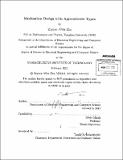Mechanism design with approximate types
Author(s)
Zhu, Zeyuan Allen
DownloadFull printable version (5.220Mb)
Other Contributors
Massachusetts Institute of Technology. Dept. of Electrical Engineering and Computer Science.
Advisor
Silvio Micali.
Terms of use
Metadata
Show full item recordAbstract
In mechanism design, we replace the strong assumption that each player knows his own payoff type exactly with the more realistic assumption that he knows it only approximately: each player i only knows that his true type [theta]i; is one among a set [Kappa]i, and adversarially and secretly chosen in Ki at the beginning of the game. This model is closely related to the Knightian [20] notion of uncertainty in economics, but we consider it from purely mechanism design's perspective. In particular, we study the classical problem of maximizing social welfare in auctions when players know their true valuations only within a constant multiplicative factor [delta] [xi] (0,1). For single good auctions, we prove that no dominant-strategy mechanism can guarantee better social welfare than assigning the good to a random player. On the positive side, we provide tight upper and lower bounds for the social welfare achievable in undominated strategies, whether deterministically or probabilistically. For multiple-good auctions, we prove that all dominant-strategy mechanisms can guarantee only an exponentially small fraction of the maximum social welfare, and the celebrated VCG mechanism (which is no longer dominant-strategy) guarantees, in undominated strategies, at most a doubly exponentially small fraction. For general games beyond auctions, we provide definitional foundations for this new approximate-type model, and provide a universality result showing that all reasonable (including Bayesian or Knightian) models of type uncertainty are equivalent to our set-theoretic one, at least for the setting when the type space is "convex". This work was done in collaboration with Silvio Micali and Alessandro Chiesa.
Description
Thesis (S.M.)--Massachusetts Institute of Technology, Dept. of Electrical Engineering and Computer Science, 2012. Cataloged from PDF version of thesis. Includes bibliographical references (p. 117-119).
Date issued
2012Department
Massachusetts Institute of Technology. Department of Electrical Engineering and Computer SciencePublisher
Massachusetts Institute of Technology
Keywords
Electrical Engineering and Computer Science.